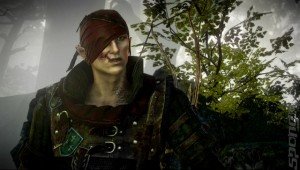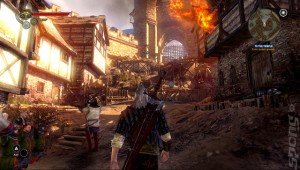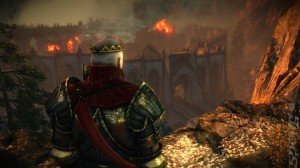
Early on in The Witcher 2, the game almost seems like it wants you to walk away – an overly long tutorial coupled with a menu system that at times can feel awkward may make you want to abandon the game. Don’t.
 As the game progresses, The Witcher 2 evolves into the closest Game of Thrones-like RPG seen in videogames (the actual upcoming Game of Thrones RPG notwithstanding). The region’s despotic monarchs are engaged in deep, political machinations, and the resolution of personal grudges usually ends with the aid of entire armies.
As the game progresses, The Witcher 2 evolves into the closest Game of Thrones-like RPG seen in videogames (the actual upcoming Game of Thrones RPG notwithstanding). The region’s despotic monarchs are engaged in deep, political machinations, and the resolution of personal grudges usually ends with the aid of entire armies.
In many ways, The Witcher 2 is a game that embraces fantasy stereotypes even as it utilizes them. There are no Lord of the Rings-style elves of the forest here; instead they are largely a race of brigands or rebels, many of whom are members of a rebellious faction known as the Scoia’tael and are revolting against the humans and their ever-expanding influence.
The dwarves, meanwhile, scrape together a living from the memory of their former glory in their dreary city. Some have migrated to human settlements such as the dingy Flotsam, encountered early in the game.
Playing as Geralt of Rivia, you are a witcher. This is a genetic mutation that changes the color of your eyes and hair, and provides you with certain magical abilities. For example, at certain points you can use your magic to influence someone during a conversation. This allows you to prevent a fight breaking out or earn more money from a job. What is your job exactly? A witcher is a hunter of monsters, and as such, you carry two swords to get the job done.
Graphically, The Witcher 2 is impressive. The graphical limitations of the Xbox 360 remain but the game pushes this technology to the edge. The opening sequence, while lengthy, is beautifully rendered, making it one of the most impressive displays on the system to date. Once you get into the game itself, the graphical quality is sacrificed in the name of smoother gameplay, but always manages to stay comparable to next-generation standards.
of the most impressive displays on the system to date. Once you get into the game itself, the graphical quality is sacrificed in the name of smoother gameplay, but always manages to stay comparable to next-generation standards.
One blade will be a standard steel weapon for human, elven, or dwarven enemies, whereas the silver sword is your tool of choice for taking on ghouls and other fantastical beasts you encounter. Yet the combat is never especially compelling, and at times can be punishing. On the harder difficulty levels, “insane” being the highest, enemies inflict massive damage. It’s not possible to load a save when Geralt dies, so remaining vigilant and smart are the keys to survival. Learning the control scheme is important, and although the scheme is relatively straightforward, it is recommended you become familiar with the controls before you go too far.
Another problem you will face in The Witcher 2 is navigation. Both local and world maps are virtually worthless, with your direction and destination often being difficult to ascertain. Another issue is the size of quest markers and quest fail notices, which are very small and unclear. There are occasions when you’ll start one side mission only to find out later that it blocks off quite a few additional quests. A better notification system would avoid such problems and would give the player more warning before their quest is permanently altered.
You’ve probably heard that The Witcher 2 is an adult game, and it certainly is. Language, violence and lots of sex have certainly earned this game its mature rating. But the game can be described as such because of more than just those features. Much like Game of Thrones, you are cast into a melting pot of intrigue and Machiavellian politics. This is a game that not only assumes you are intelligent, but one that also expects you to appreciate everything that’s going on – in other words, it expects you to be interested. And you should be. The interspecies hostility and deep history will draw you in every bit as much as the sweeping narrative and extensive player  customization. As choice goes, The Witcher 2 beats, or at least competes admirably with, virtually all the western RPGs out there. As much as 50% of the game can be different in a second playthrough if you make different choices.
customization. As choice goes, The Witcher 2 beats, or at least competes admirably with, virtually all the western RPGs out there. As much as 50% of the game can be different in a second playthrough if you make different choices.
Regardless of the choices you make, the game is refreshingly gritty. Gone are the colorful tones of Kingdoms of Amalur - here the forests are dark and brooding, the cities dank and dangerous.
Over the course of the game, many of the choices you make feed into the much broader simmering conflict between humans and non-humans, with Geralt caught between the two camps. His decisions can have broad implications for the future of the Northern Kingdoms. Nevertheless, in this game you are a cog in a machine. An important cog, but a cog nonetheless. There is a much greater political and social backdrop to your adventure, and you get the impression that it would carry on with or without your involvement. You are no Dragonborn here.
Overall, The Witcher 2 is a game that is more than simply adult – it is a visceral, mature experience. This is a good thing for both for the genre and the game industry as a whole. It remains the same great RPG it was on PC last year, with some minor technical limitations and occasional graphical issues that only slightly hold it back from being elite. Even at its best, the Xbox 360 can’t quite match the performance of high-end computers, but the game still manages to provide players with a memorable experience and one that should be shared by all.
Rating: 









This review is based on a retail copy of the Xbox 360 version of The Witcher 2 Enhanced Edition by CD Projekt Red distributed by WB Games.

